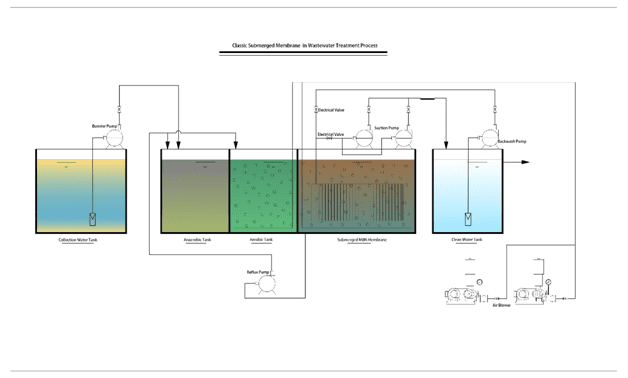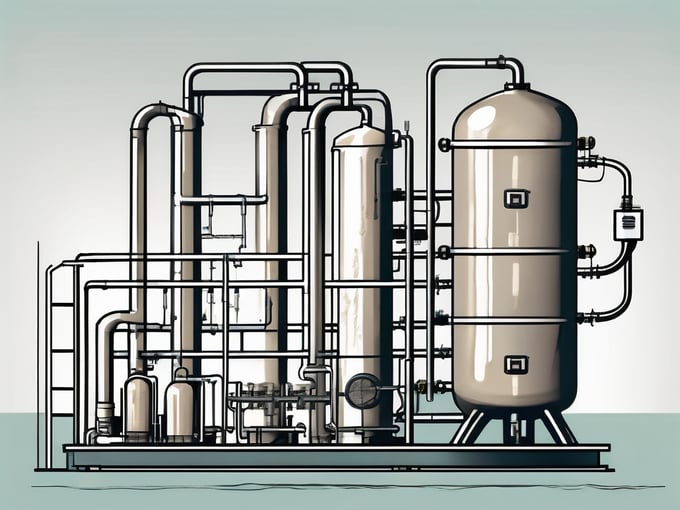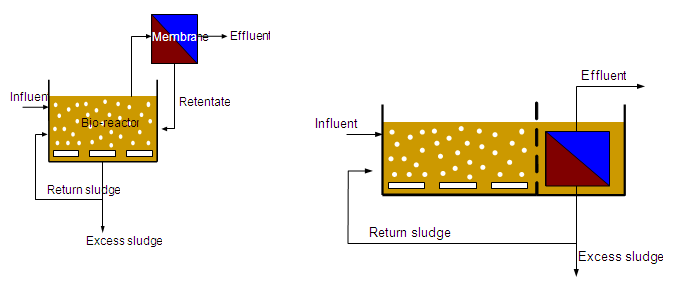How Membrane Bioreactor Contributes to the Reduction of Energy Consumption in Water Treatment
How Membrane Bioreactor Contributes to the Reduction of Energy Consumption in Water Treatment
Blog Article
Membrane Bioreactors Described: Reliable Solutions for Clean Water
Membrane layer bioreactors (MBRs) have arised as an advanced option for dealing with the pressing obstacles of wastewater treatment - Membrane Bioreactor. By incorporating biological processes with sophisticated membrane layer purification, MBRs not only improve the top quality of treated water but also decrease the spatial requirements of treatment centers.

What Are Membrane Layer Bioreactors?
Membrane bioreactors (MBRs) are advanced wastewater therapy systems that combine biological destruction processes with membrane filtering modern technology. This combination permits the efficient elimination of impurities from water, making MBRs a preferred choice in various applications, including community wastewater treatment and commercial effluent administration.

Among the essential benefits of MBRs is their ability to produce high-grade effluent, commonly suitable for reuse in irrigation or industrial processes. In addition, MBRs require a smaller impact compared to conventional therapy systems, making them excellent for metropolitan settings where space might be restricted.
Moreover, MBRs can properly take care of varying influent tons and are much less vulnerable to the results of toxic shocks. These attributes contribute to their expanding popularity as a lasting option for resolving the enhancing need for tidy water while lessening ecological impacts.
How Membrane Bioreactors Work
While the procedure of membrane bioreactors (MBRs) might seem complex, it fundamentally revolves around the synergy between biological processes and membrane purification. MBRs incorporate an organic treatment process, commonly turned on sludge, with a membrane layer separation system to deal with wastewater efficiently.
In an MBR system, wastewater is first introduced into a bioreactor where microorganisms weaken natural issue and various other pollutants. The biological task reduces the focus of toxins while advertising the development of biomass. Following this biological treatment, the combined alcohol is subjected to membrane filtration, which can be microfiltration or ultrafiltration, relying on the preferred effluent top quality.
The membrane layers serve as a physical barrier, permitting water and small solutes to pass while retaining suspended solids and bigger molecules. This enables the system to preserve a high focus of biomass within the activator, enhancing the treatment performance.
In addition, the continuous separation of treated water from the biomass facilitates a compact design and reduces the impact of the therapy facility. On the whole, the combination of organic degradation and membrane layer filtering in MBRs results in reputable and reliable wastewater therapy, ensuring top notch effluent appropriate for numerous applications.
Advantages of MBR Modern Technology
Among the crucial advantages of membrane layer bioreactor (MBR) technology is its capability to create top notch effluent with a substantially minimized impact contrasted to traditional wastewater therapy techniques. MBR systems efficiently incorporate biological therapy and membrane layer purification, leading to superior elimination of contaminants, consisting of suspended solids, virus, and raw material. This capacity leads to effluent that usually meets or surpasses stringent regulative criteria for reuse and discharge.
Furthermore, MBR technology enables greater biomass focus, which enhances the therapy effectiveness and minimizes the required reactor volume. This compact layout is especially advantageous in urban locations where space is restricted. The functional adaptability of MBR systems likewise indicates they can adapt to varying influent top qualities and circulation rates, making them appropriate for a variety of applications.
Furthermore, the decreased sludge manufacturing related to MBR procedures contributes to lower functional and upkeep costs. The membranes act as a physical obstacle, reducing the danger of obstructing and making it possible for longer operational durations between cleansing. Generally, the advantages of MBR innovation make it an appealing solution for sustainable wastewater treatment, resolving both environmental concerns and the requirement for effective resource management.
Applications of Membrane Layer Bioreactors
With their versatility and effectiveness, membrane layer bioreactors (MBRs) discover applications throughout different fields, consisting of municipal wastewater therapy, industrial procedures, and also water recovery. In municipal setups, MBRs provide a compact remedy for treating wastewater, properly getting rid of impurities while at the same time generating high-grade effluent that meets rigorous regulative criteria. This makes them particularly appropriate for areas with minimal area.
In industrial applications, MBR modern technology is used for treating process water, especially in sectors such as food and beverage, pharmaceuticals, and petrochemicals. These sectors benefit from MBRs' ability to take care of high natural lots and their effectiveness in recuperating valuable resources from wastewater, such as nutrients and water.
In addition, MBRs play a critical duty in water improvement initiatives, allowing the reuse of dealt with wastewater for watering, industrial processes, and even as safe and clean water after more treatment (Membrane Bioreactor). Their performance in getting rid of virus and pollutants makes them a reputable selection for making sure water quality in various reuse applications
Future of Water Treatment Solutions
The future of water treatment solutions is poised for transformative advancements driven by technological innovation and recommended you read increasing ecological awareness. As international water shortage comes to be a pressing problem, new methodologies, including membrane layer bioreactor (MBR) systems, are set to play a crucial role in enhancing the performance and sustainability of water therapy processes.
Arising innovations such as expert system and machine discovering are try this website anticipated to optimize treatment procedures, permitting real-time tracking and predictive maintenance. This will enhance the overall integrity and performance of water treatment facilities. Developments in membrane products, such as graphene and nanofiltration, guarantee to boost permeation prices and minimize fouling, leading to lower energy usage and functional costs.
In addition, the integration of sustainable energy sources into water therapy plants will certainly add to greener practices. The circular economic climate version will certainly additionally get traction, urging the healing of important sources from wastewater, such as nutrients and energy.
Final Thought

Membrane layer bioreactors (MBRs) have emerged as an advanced service for addressing the pressing difficulties of wastewater treatment. By integrating organic procedures with innovative membrane purification, MBRs not only boost the quality of treated water however also minimize the spatial needs of therapy facilities.One of the essential advantages of membrane bioreactor (MBR) modern technology is its capacity to produce high-quality effluent with a dramatically decreased impact contrasted to traditional wastewater treatment approaches.With their convenience and effectiveness, membrane layer bioreactors (MBRs) find applications across numerous markets, consisting of municipal wastewater treatment, industrial processes, and even water recovery.In conclusion, membrane layer bioreactors represent a significant development in wastewater treatment modern technology, incorporating biological processes news with efficient membrane layer filtration to produce top quality effluent.
Report this page